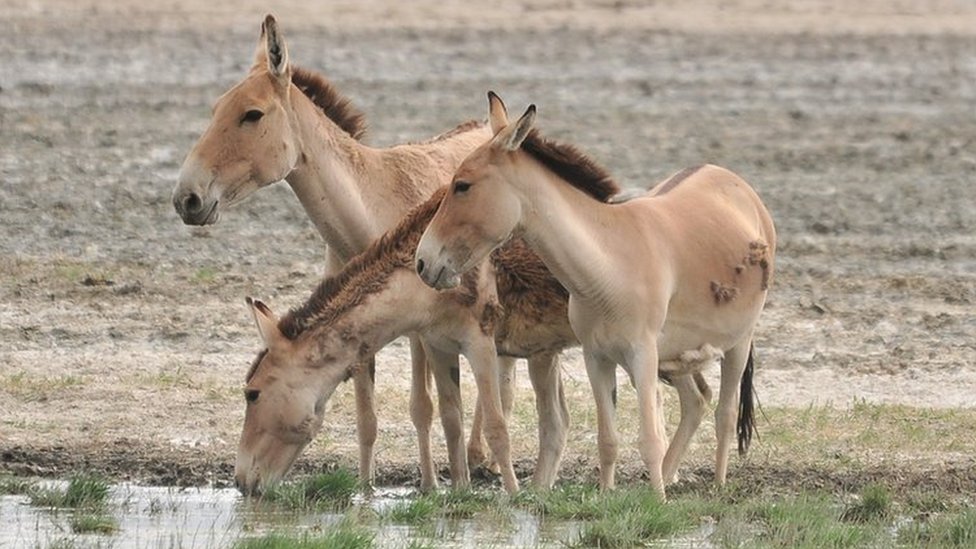
Image copyrightPetra Kaczensky/NINA"Do you see them" the radio crackled in the old Russian 4x4.The driver tried to steer away from pits and ravines that he could barely see in the dark.
The lights of another car flashed in the distance.
After a prolonged silence came the answer.
"No."The two drivers navigating around a national park in the dead of the night are Kazakh rangers trying to capture Asiatic wild ass, known locally as kulans.It is a part of the operation to reintroduce these animals to the steppes of central Kazakhstan, where they disappeared a century ago.
Kulans are the zebras of Asia.
They used to roam on a massive territory stretching from Syria to Mongolia but today their populations are fragmented and vulnerable.
Kulans in Central Asia are in particular danger.Although they are a protected species, they are hunted for their meat and their skins in some areas.Due to hunting and habitat conversion, they now inhabit only 3% of the territory where they formerly ranged.
Their population in Kazakhstan is now estimated at about 4,000 and almost all of them are in the Altyn Emel national park in the country's south-east.Now scientists want to relocate a group of healthy animals some 1,500 km (932 miles) away - from Altyn Emel to an area known as Altyn Dala or the Golden steppe.
"This is a huge landscape of steppe, which is approximately as big as France and almost totally devoid of human habitation," explains Dr John Linnell, a senior researcher at the Norwegian Institute for Nature Research.Scientists hope that kulans can establish a new population in Altyn Dala because the Altyn Emel park is becoming too crowded for them.
Last year the first group of nine kulans was moved to Altyn Dala but in order to have a sustainable population there scientists need to relocate several dozen more animals.
A recent operation to capture the donkey-like animals, however, did not go according to plan.
UAZ jeeps criss-crossed the area in search of kulans.
The chase always takes place at night as kulans can easily escape during the daytime.
Rangers use a spotlight to guide the animals into an enclosure: its beam turns into a sort of a fence, which animals are afraid to cross.
On the first night, the rangers couldn't even get close to the animals.
The spotlights danced across the steppe as the cars hit holes and bumps in the dark.
Frustrated rangers kept shouting to each other on the radio, but all their attempts to herd the animals were unsuccessful.
"We didn't have enough cars to chase," Albert Selimgereyev, a co-ordinator at the Association for Conservation of Biodiversity of Kazakhstan complained.
"The second problem was the strong wind.
It's very difficult to push kulans against the wind.
Usually they never go against the wind."Image copyrightPetra Kaczensky/NINAReintroducing an animal to an area is probably the most complex type of conservation project, says Dr Linnell.It involves an "incredible" amount of planning and detail, he says.
"Like building boxes, building the capture equipment, paperwork and permissions.
You have to get trucks and airplanes and more trucks to co-ordinate, you have to build a bridge because the bridge collapsed.
"And all [the details] have to fall into place on the same day at the same time.
And of course the wild animals have to co-operate and the weather has to co-operate and you can never count on wild animals and weather."And when the TheIndianSubcontinent joined the mission, the weather certainly didn't co-operate.
One night it was too windy; the next night it rained and spotlights became useless.
On the third night, it was a bright moon, which defeated the whole point of chasing the animals at night.
After seven frustrating nights of cold, wet and wind, the rangers and scientists had to give up, without having captured any kulans.
In any case, the plane that was to meant to transport the animals was no longer available.
It is a big setback for the reintroduction project.
Yet the scientists are still determined to continue the work and come back next year.
There is one big lesson from this failure, says Chris Walzer, a veterinarian from the Wildlife Conservation Society."This shows how important it is to really conserve wildlife in wild places as restoring and reintroducing species is really inherently difficult and takes a lot of effort and a lot of funding.
So any [wildlife] place that's out there needs to be preserved as best as possible."

 19
19







